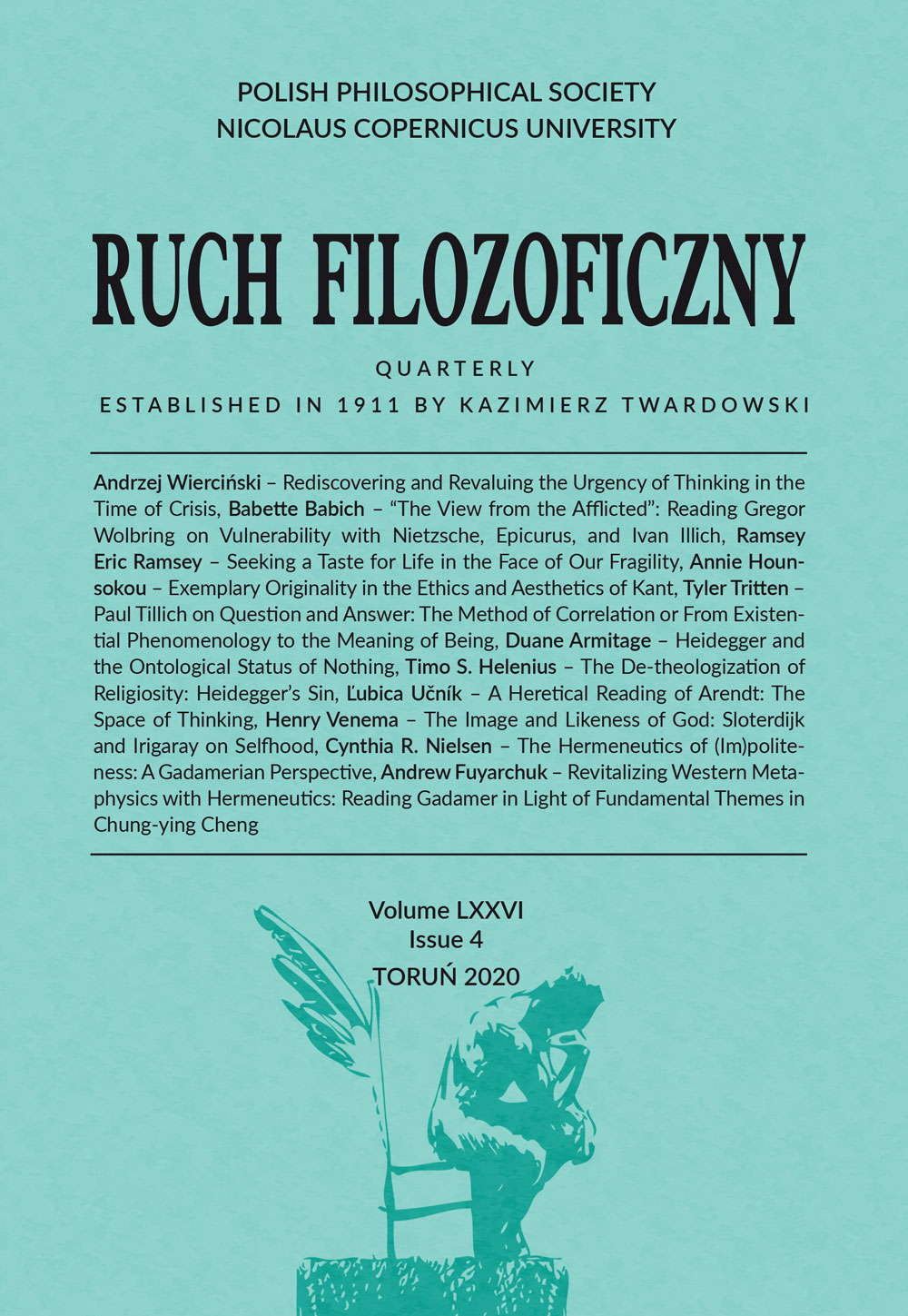Paul Tillich on Question and Answer: The Method of Correlation or From Existential Phenomenology to the Meaning of Being
DOI:
https://doi.org/10.12775/33063Słowa kluczowe
Paul Tillich, Martin Heidegger, Correlation, Phenomenology, Existentialism, Ontology, Metaphysics, God, demonic, holyAbstrakt
This essay is an attempt to reconstruct Paul Tillich’s argument that existential philosophy is not adequate to answer the question, i.e. the problem, of the human situation because mere existentialism, consisting of a phenomenological description of the human predicament, serves as a departure point for ontology only. Only revelation can provide a sufficient “essentialist” response to this problem. Tillich is also an Augustinian rather than a Thomist. As such, he finds the human connection to God within the soul rather than positing God as an object, e.g. as a first or final cause, outside the soul. This Augustinian principle grounds the possibility of truth for Tillich, which is, arguably, the decisive point of his theology. The emphasis throughout his work that God is not a being is but one lucid example of his rejection of Thomism as well as his general rejection of God as a supernatural, that is, transcendent or externally located being. This distinction precludes any proofs for God’s existence for Tillich, which must thus be a matter of revelation. God is either immediately present to the soul rather than inferred or not at all. Accordingly, this essay will show how, given this Tillichian foundation, God can be first both with respect to the order of being and of knowledge.
Bibliografia
Aristotle. 1998. The Metaphysics, transl. Hugh Lawson-Tancred. London: Penguin Books.
Hamilton Kenneth. 1963. The System and the Gospel: A Critique of Paul Tillich. London: SCM.
Heidegger Martin. 1996. Being and Time, transl. Joan Stambaugh. New York: State University of New York Press.
Heidegger Martin. 1977. “Letter on Humanism”. In: Martin Heidegger. Basic Writings, ed. David Farrell Krell, 193–242. New York: Harper & Row.
Heidegger Martin. 2003. Plato’s “Sophist”, transl. Richard Rojcewicz & Andre Schuwer. Bloomington: Indiana University Press.
Hick John (ed.). 1970. Classic and Contemporary Readings in the Philosophy of Religion. New Jersey: Englewood Cliffs.
Kant Immanuel. 1998. Critique of Pure Reason, transl. & Ed. Paul Guyer and Allen Wood. Cambridge: Cambridge University Press.
Kaufmann Walter. 1958. Critique of Religion and Philosophy. Princeton: Princeton University Press.
Levinas Emmanuel. 1979. Totality and Infinity: An Essay on Exteriority. Transl. Alphonso Lingis. Boston: Martinus Nijhoff Publishers.
MacIntyre Alasdair. 1963. “God and the Theologians”. In: The Honest to God Debate, ed. D. Edwards and J.A.T. Robinson. London: SCM.
Macquarrie John. 1994. Heidegger and Christianity. London: SCM.
Nagel Thomas. 1986. The View From Nowhere. New York: Oxford University Press.
Newport John P. 1984. Paul Tillich, ed. B. Patterson. Waco: Word Books.
Nietzsche Friedrich. 1910. The Joyful Wisdom, transl. Thomas Common. London: George Allen & Unwin Ltd.
Nuovo Victor. 1978. “On Revising Tillich: An Essay on the Principles of Theology”. In: Kairos and Logos, ed. J. Carey. Macon: Mercer University Press.
Ogden Schubert M. 1977. The Reality of God and Other Essays. New York: Harper and Row.
Randall John Hermann Jr. 1952. “The Ontology of Paul Tillich”. In: The Theology of Paul Tillich, ed. C. Kegley and R. Bretall. New York: Macmillan.
Robinson John Arthur Thomas. 1963. “Comment”. In: The Honest to God Debate, ed. D. Edwards and J.A.T. Robinson. London: SCM.
Robinson John Arthur Thomas. 1963. “The Debate Continues”. In: The Honest to God Debate, ed. D. Edwards and J.A.T. Robinson. London: SCM.
Robinson John Arthur Thomas. 1967. Exploration into God. London: SCM.
Sartre Jean Paul. 1992. Being and Nothingness, transl. H. Barnes. New York: Washington Square Press.
Schelling Friedrich Wilhelm Joseph. 1978. System of Transcendental Idealism, transl. P. Heath. Charlottesville: University Press of Virginia.
Thatcher Adrian. 1978. The Ontology of Paul Tillich. Oxford: Oxford University Press.
Thomas John H. 1963. Paul Tillich: an Appraisal. London: SCM.
Thomas John H. 2000. Tillich. London: Continuum.
Tillich Paul. 1970. The Courage To Be. (First Edition). New Haven: Yale University Press.
Tillich Paul. 1957. The Dynamics of Faith. New York: Harper & Row Publishers.
Tillich Paul. 1974. The Construction of the History of Religion in Schelling’s Positive Philosophy: Its Presuppositions and Principles, transl. with intr. V. Nuovo. Lewisburg: Bucknell University Press.
Tillich Paul. 1961. “The God Above God”. The Listener 66: 169–172.
Tillich Paul. 1968. A History of Christian Thought. New York: Harper & Row.
Tillich Paul. 1967. Perspectives on 19th and 20th Century Protestant Theology, ed. C. Braaten. London: SCM.
Tillich Paul. 1948. The Protestant Era, transl. J. Adams. Chicago: University of Chicago Press.
Tillich Paul. 1951. Systematic Theology Vol. I. Chicago: The University of Chicago Press.
Tillich Paul. 1957. Systematic Theology Vol. II: Existence and the Christ. Chicago: The University of Chicago Press.
Tillich Paul.1963. Systematic Theology Vol. III: Life and the Spirit: History and the Kingdom of God. Chicago: The University of Chicago Press.
Tillich Paul.1981. The System of the Sciences According to Objects and Method, transl. P. Wiebe. Lewisburg: Bucknell University Press.
Tillich Paul. 1946. “Two Types of Philosophy of Religion”. Union Seminary Quarterly Review. May: 3–13.
Tillich Paul. 1965. Ultimate Concern: Tillich in dialogue, ed. D. Brown. New York: Harper and Row.
Pobrania
Opublikowane
Jak cytować
Numer
Dział
Statystyki
Liczba wyświetleń i pobrań: 1513
Liczba cytowań: 0



